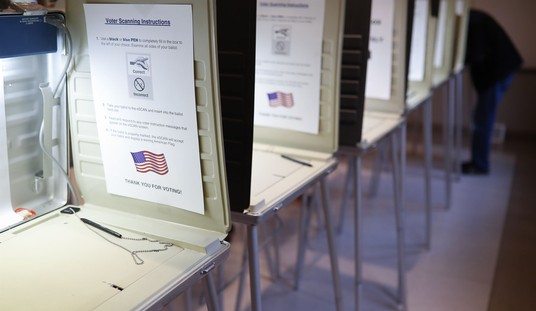Reparations made it back into the news briefly last week, thanks to Ta-Nehisi Coates writing an Atlantic cover story on the subject. Kevin Williamson at National Review did a great job of deconstructing Coates’ argument, which was itself made with greater care than racial activists generally employ. Even someone wholeheartedly and unalterably opposed to reparations can find some food for thought in how Coates describes the lingering effects of institutionalized discrimination.
This passage from Williamson’s rebuttal jumped out at me, because it ties into a subject I’ve been writing about lately: the urgent need for socialists of every stripe to make Americans see themselves as a nation of criminals, so that we’ll voluntarily shackle ourselves with Big Government, humbly accepting a sentence of eternal service to the righteous State without possibility of parole.
Mr. Coates does not make the case so much for reparations as for a South Africa–style truth-and-reconciliation commission. “The crime with which reparations activists charge the country implicates more than just a few towns or corporations. The crime indicts the American people themselves, at every level, and in nearly every configuration. A crime that implicates the entire American people deserves its hearing in the legislative body that represents them.” The purpose of a debate on a reparations bill of the sort being offered by John Conyers Jr. is not so much to construct a program of economic compensation as it is to have another verse of that Democratic hymn, an honest conversation about race. (As though we ever talked about anything else.)
And this gets to the real defect in Mr. Coates’s approach. The purpose of public policy in this area can be one of two things. The first is a program focused on trying to improve in real terms the lives of those who are poorly off and those born into circumstances that are likely to lead to their being poorly off adults, proceeding with the intellectual honesty to acknowledge that such programs will disproportionately benefit black Americans, as they should. The second option is a symbolic political processdesigned to confer a degree of psychic satisfaction on relatively well-off men and women such as Ta-Nehisi Coates.
We understand the idea of deploying coercive government force against crooks, so if we accept the judgment of the Left that everyone is crooked in some way or other – a judgment that holds America itself guilty beyond appeal for past, current, and future injustice – then we’ll swallow bigger government using force against a larger segment of the population.
Here we have a literal demand to accept precisely such a judgment, phrased in terms of criminal accusations so irresistible that the accused receive no presumption of innocence, or even a trial. Good thing, too, because not even the greatest prosecutors in legal history would be able to actually prove the charges of slavery against any living American. (Alas, there are still people in the United States engaged in various forms of slavery, but that rare and despicable contemporary offense is not what reparations activists are talking about.) Reparations are as fundamental a perversion of the American understanding as anything contemplated since the end of slavery, a complete inversion of everything we believe about individual accountability, liberty, and due process.
Instead, reparations advocates ask us to view ourselves as corrupt platelets in the diseased bloodstream of a massive, immortal organism called The American People, which can be found guilty of historical “crimes” and subjected to fines and penalties, which of course the rest of us would be obligated to cover. That’s really not a new idea, because we already allow numerous government offenses against individual property and liberty on the grounds of “social justice,” without any effort made to prove that anyone paying the fines is guilty of lawbreaking, or even malicious intent. Reparations are just the extreme, explicit statement of an idea implicit in much of what our gigantic social-engineering government does. We put up with it because we have been made to feel guilty. Anyone who speaks out against the expensive quest for “social justice” will quickly find that general sense of diffuse collective guilt focusing into explicit and personalized attacks.
Sometimes the argument against reparations is made on a practical basis: How much would a person who just immigrated to the United States, and has not even the most tenuous historical connection with either slavery or American “white privilege,” be expected to pay? Would it matter which country they came from, and what color their skin was? How much would a fabulously wealthy second-generation immigrant from an African nation expect to collect? What about someone who has both white and black parents? Would there be some sort of Bureau of Historic Justice convened to measure each person’s guilt or victimization level, setting social-justice fines or reparations payments accordingly?
Asking this question, with an eye toward exposing the absurdity of a reparations regime, misses the point. There would be nothing like that level of care exercised in judging guilt or innocence. It would be mostly about shoveling money down the usual transmission belt of political connections, with billions vanishing into bureaucratic overhead and dubious claims. It would probably be financed with magic deficit money, so no specific white people would be ordered to pay up until years later, when the next liberal President decided it was the right time to put on his goofy “deficit hawk” costume and scream for tax increases to balance the budget. Some of the people who paid those tax increases would be the very same people who got reparations payments a few years previously. Take a look at the Pigford scandal for an idea of how full-blown reparations would play out.
But none of this is ever going to happen, because the reparations idea is so absurd and offensive to even the most diluted American standard of justice that it will never happen, and the people pushing it are well aware of that. They don’t mind. The point of touting reparations is to inject more guilt and shame into the American system. A great deal of racial politics has that objective. It’s all very useful to the masters of Big Government, who profit handsomely by presiding over a subjugated, neurotic populace that feels comfortable on its knees, with head bowed.
Liberals are very much aware of how the growth of State power requires an atmosphere of permanent collective guilt. The whole “racist Tea Party” meme isn’t just an effort to discredit and intimidate critics of Barack Obama into obedience. It’s another dose of the old “evil rednecks in flyover country” snake oil, meant to convince Americans that the most successful grassroots movement in generations was a Klan rally at heart. This led to the astonishing foolishness of the Washington Posts’ Eugene Robinson – a Pulitzer prize winner – pretending he’s 12 years old, and never heard the phrase “Take Back Our Country” at a political rally before those dog-whistling, treasonous, racist Tea Party types watched a black family move into the White House.
It’s too bad for the Left if scurrilous charges of racism don’t browbeat Barack Obama’s adversaries into silence, but as long as it contributes to the American people seeing themselves as a fundamentally sinister gaggle of hateful boobs, eternally one step away from backsliding into anarchic evil without the firm hand of Big Government steady on the backs of their necks, then mission accomplished. Collective guilt authorizes collectivist power, and perpetual submission. Be grateful for whatever liberty the Ruling Class allows to fall into your childish hands, and remember, no innocent people are born into a nation bearing two and a half centuries of guilt.














Join the conversation as a VIP Member